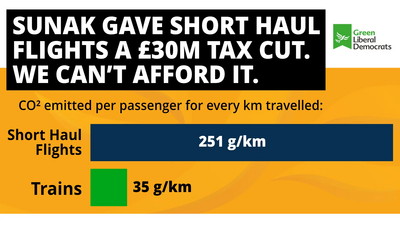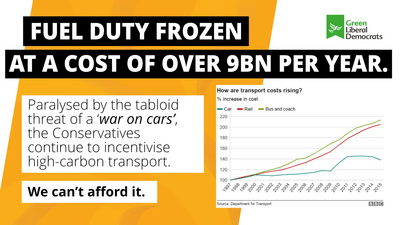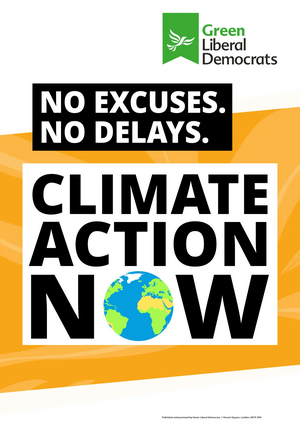The 2021 Budget - Three Key Headlines
On Wednesday, Rishi Sunak's long awaited - and frequently leaked - 2021 budget was revealed in the House of Commons. Let's go over three of the key headlines.
Tax Cuts for Domestic Flights

According to a study commissioned by Greenpeace and published on Wednesday, over one third (34%) of the busiest short-haul flights in Europe have viable, less polluting train alternatives. Researchers found that European nations could replace almost all the top 250 short-haul flights and save 23.4 million tons of CO2 per year, equal to the annual CO2 output of Croatia. Aircraft on routes shorter than 700km emit 250grams of CO2 per person per km. In comparison, long haul flights and and even diesel cars look squeaky clean, at 195 and 171g/km respectively. Electrified rail, however? 35g/km. Eurostar? 6g/km. Aviation has been the fastest growing source of greenhouse gas emissions in Europe in the last three decades, whilst our trusty locomotive is only gaining in efficiency.
Sunak handed out a £30m annual reduction in taxes on domestic, short-haul flights. This is not a fiscally significant quantity, but the greatest failing of the policy is in what the government is telling consumers, operators, and the world. In contrast, France is currently moving to ban all domestic flights where a low-carbon alternative is available, initiating what President Macron's party LaREM marked as "a profound transformation of the aviation sector, favouring the train or other means of public transport for short distances is common sense and a key gesture for the climate." For a party obsessed with gestures, the Conservatives appear ignorant to the significance of their decision. In the same week that we invite nations rich and poor to our shores in efforts to achieve a shared global strategy, a flagship initiative within the budget demonstrates a belief within the party that high-carbon conveniences should be incentivised.
Maintaining the Fuel Duty Freeze

Fuel Duty has now been frozen since 2010 at 57.95p per litre of petrol and diesel. Road transport is the country's most emitting sector, responsible for 23% of national emissions according to the Parliamentary Climate Change Committee. Unlike other sectors that have 'cleaned up' to signifcant degrees, road transport emissions fell just 1% between 2009 and 2019.
If we are to ever achieve net zero, emissions within the transport sector must decrease rapidly, and a consensus is broadly understood by both scientific communities and the Government's own policy consultants. Carbon taxes, as discussed by our Special Interest Group and within Challenge Magazine, are a necessary method of incentivising low-carbon behaviours from individuals and organisations. Carbon pricing applied through fuel duty is a readily implementable means of incentivising the uptake of Ultra-Low Emission Vehicles (ULEVs), according to findings by the Grantham Research Institute.
In 2019, Senior Policy Fellow at the London School of Economics Josh Burke proposed a carbon tariff of £40 per tonne of CO2, which would represent just under a 10p/litre increase to 67.19p/litre. This would allow the treasury to collect some of the £100billion in lost taxes since the freeze and with road traffic projected to increase by 51% by 2050 at current trends, we need to incentivise a transition to zero carbon transport options. Maintaining the fuel duty freeze in fear of tabloid headlines foretelling a 'war on cars' is another in a long line of wasted opportunities that our country can ill afford.
Road Investment
Professor Greg Marsden of the Institute for Transport Studies at the University of Leeds has previously critiqued the "shovel-ready infrastructure expansion on the roads" that "will, regrettably, simply dig us a bigger climate hole to get out of." Roadbuilding must be considered as an aspect of a wider carbon plan. Rather, Sunak committed £21bn for roadbuilding within the 2021 Budget and declared in 2020 a plan for 4000 new miles of tarmac by 2025. If current averages are to be employed those plans would result in annual carbon output equivalent to 396,000 homes, at 1.98 million tonnes of CO2.
It is well accepted that new roads create new traffic. This is not a recent observation made by a 'mung bean munching eco freak', but a dogma observed as early as 1925. Ministry of Transport guidance in 1968 described 'generated traffic', and almost every serious engagement with the influence of road development has repeated these findings. Given the benefit of a century of research, one might be forgiven for assuming that any Government with intentions on improving the climate, air quality, and the shortcomings in regional connectivity may turn beyond the staid.
Reliably, the Government's national infrastructure strategy and Integrated Rail Plan that might offer insight into the approach of Government expenditure has been delayed until later this year. The uncertainty and instability has been noted by all. Lip service was paid to rail investment within Sunak's speech, but it was revealed prior to the budget that little of that offering was new money; a restating of that previously committed to HS2 and Northern Powerhouse Rail, which themselves appear to be under significant threat of 'scaling back'.
Conclusions
Throughout the budget the climate is absent. In fact, Sunak dared not utter the word. Instead, we were presented with a Government looking to invest in planes, petrol, and paving. There is no innovation, no commitment to recognising the failed dogma of private transport on four wheels, and little regard for the opportunities that fundamental investment in green infrastructure can provide our environment, economy, and communities. We can't afford this budget.

The Liberal Democrats have a five-point Green Recovery Plan. We are calling for a £150bn investment in:
- Saving our countryside by cleaning up our waterways, restoring peat bogs and planting trees.
- Greening every home by upgrading insulation in all existing homes by 2030 and requiring all new homes to be eco-friendly.
- A transport revolution of rail, bus, tram, and electric vehicle investment.
- A green energy switch to 80% clean production by 2030.
- Clean air for kids through safe walking, cycling and public transport routes to schools.
The differences between our approach and that of the Conservatives are clear. We recognise not only the fundamental risks of delays and excuses, but the revolutionary capabilities of investment in our natural environment. Britain must be a world leader in climate action, but this is not self-sacrifice in service of an abstract future.
Rather, by creating green jobs for stable, satisfying employment, by improving transport links, and cleaning up our ecological environment we can improve the experiences of all privileged to inhabit our earth now, and perhaps go some way to protecting it for those that come after us.
Francis J. Thomas
